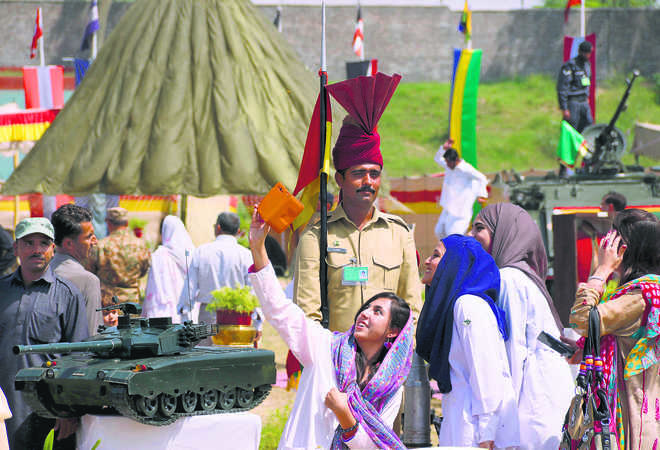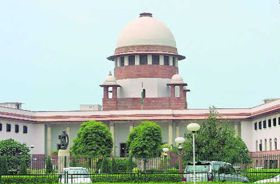
An all-round perspective: These books chronicle Pakistan''s people and their daily life; its political journey, which has oscillated between the maulana and the fauji''s ingress in policy making and implementation and its cultural heritage with shared roots with other Asian countries in the sub-continent photo: Reuters
Sandeep Dikshit
Pakistan, like other Muslim countries, is in the throes of a bitter domestic contest on the extent of application of Islam to matters of state, personal preferences and accommodation of diversity. Over the past three decades, the thunder has literally been stolen by the Wahabis\ Takfiris with their accent on violence. But, in the centuries of conflict with this fikra, the moderates have always pulled back the situation, sometimes from the brink.
Nadeem Farooq Paracha, with roots in northern Punjab and formative years spent in Karachi, bears optimism for his country borne out of a conviction in his ancestry. However, it does not bear one single imprint. For, that is the main rub in the bitter debate that has split Muslim societies.
As Paracha came of age, he distils the numerous experiences and encounters while he scored hashish, went on longish boat rides, covered art and music or generally bummed his way around. In the process, he reveals a country that numerous chroniclers of Pakistan’s political journey have completely missed in their obsession with the generals, the militants and the hapless political leaders caught in between.
Here is a Pakistan that goes about its daily life with the normal nonchalance of any other country. There are several points of entry into Pakistan, and not just one from the Khyber Pass. And, he detects people, who are as varied in their origins and reflexes as anywhere else: the hazel-eyed youth, who thought his ancestors came from Greece and finally made his way there; the guide at Mohenjo Daro, who early on disabused Paracha of the notion that his ancestors were Arabs; the Christians musicians of Karachi whose livelihood, performing at bars and hotels, slipped away as did their bohemianism with the ever-tightening embrace of Islamic ‘values’; Asma Jehangir’s successful fight to allow liquor shop owners earn their livelihood (and enable Paracha and friends to continue patronising them) and the inability of the intolerant to extinguish the cultural and gastronomical influences or the respect to other cultures and traditions, some of which even emanated from Zaire.
***
Stumbling, too many times
The field is saturated as far as scholarship on Pakistan’s political and security travails are concerned. Very little worked out as Pakistan’s protagonists had imagined it would — the founding fathers departed early, leaving the field to novices and a few surviving institutions of the British Raj that quickly made a comeback. There was a period of heady growth, an acceptance on the world stage and admittance to the core of Islamic politics. Things became difficult after the disastrous handling of internal dissent by a quickly-promoted general (Yahya Khan) and a complicated and complexed politician (Bhutto), a fall-out between the politician and the army, democracy’s fitful returns and a political tapestry dominated by two families and a succession of men in uniform.
Tilak Devasher spent half a lifetime tracking it all from the closest quarters possible in India. His first work was dire, examining the strains on Pakistan’s identity, education, natural resources, economy and demography — all due to the inordinate ingress of the maulana and the fauji in policy making and implementation.
The second work is a distillate of his years in the Cabinet Secretariat and research while authoring Pakistan: Courting the Abyss. But it has a frisky, light-hearted touch as he goes about narrating all the little-known and hardly-unknown crumbs that fell off the high table while Pakistan went about its political journey of the past 70 years: the hard drinking Yahya Khan, who fell for every attractive apparition, the many political somersaults and half-truths of Bhutto and Nawaz Sharif’s evolution from a papa’s boy and army lackey to a self-assured, if a bit cocky, politician.
It is debatable if the innards, the foibles and dissensions of the Indian state can be similarly laid out. But in Pakistan’s case, the inability of any one institution to attain primacy in managing the affairs of the state perhaps lends itself to a situation where all is allowed to hang out. Devasher collates the juicier parts while maintaining the linearity of narration of Pakistan’s history. The result is an engaging, quick read much like Paracha’s book.
***
An Indo-Islamic assertion
If Nadeem Paracha's work is frothy and anecdotal, based on every-day encounters of an itinerant life that leave pulsating scars and fond recollections, Raza Rumi drills deep into the many souls that comprise Pakistan — the Sindhi, Pashtun, Punjabi and Baloch. The point they are making is the same: Current beliefs and practices in Pakistan still reflect continuity with the past. The composite shrines along the banks of Pakistan's defining river, the Indus that drew Hindus and Muslims in droves may have the former in far fewer numbers today. But the fervor, piety and rituals may have remained unchanged since the Vedic times.
Paracha and Rumi are treading on bitterly contested territory about the idea of Pakistan. And Indus is a prominent marker in this debate. Aitzaz Ahsan's, The Indus Saga and The Making of Pakistan, would provide a theoretical underpinning of the case Rumi makes: The roots of Pakistan's society, culture and arts did not rise up the day Mohamed Bin Qasim planted the flag of the Umayyad dynasty in Sindh. On the contrary, its evolution of all three — society, arts and culture - was an uninterrupted movement, starting from Harappa and its various territorial components evolved autonomously, thus retaining many of the impulses handed down from thousands of centuries. The ascendency of the feminine, once represented by the cult of Kali in Sindh, was revisited differently in the poems of Shah Abdul Latif Bhittai and its resistance and strength are embodied in modern times by Mai Bakhtawar, shot dead by landlords in 1947.
With a worldview anchored in Indo-Islamic heritage, as opposed to the universal Muslim community concept, an array of Pakistan's historians, sociologists, poets and novelists belonging to this school — from the stately Faiz to the dilettante Manto; the local balladeers of distortion and loss of dreams and identity, the challenge to Talibinisation by powerful Pashto poetry; the themes of resistance and the nationalism and identity in Sindhi and Baloch literature; and, even the street-corner wit whose railing against army chief Gen. Pervez Musharraf: Chacha wardi laanda kyon naee (Uncle, who don't you doff your uniform) - got enshrined in Pakistan's rich tradition of literary dissent.
This is a world starkly different from the lurid headlines about Pakistan we confront everyday. And, it is extremely important to hear its expressions, because these are the people who in everyday language, customs and architectures provide a counter to convert Pakistan into a hybrid theocracy and then move it towards the goal of Islamic nationalism, which helps shape an anti-India strategic worldview. This makes it very important to know the people, places and emotions that celebrate Pakistan's syncretic music, arts and culture.



























